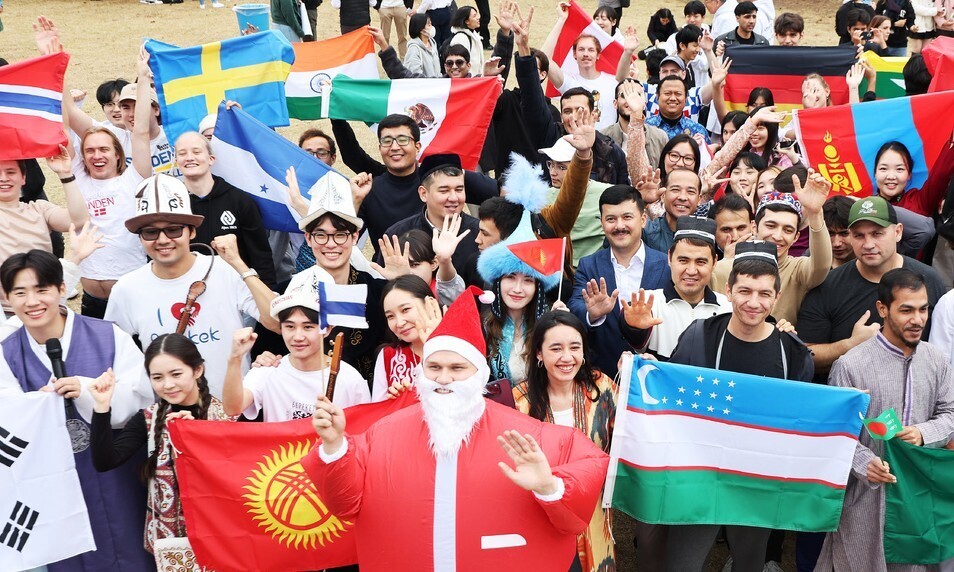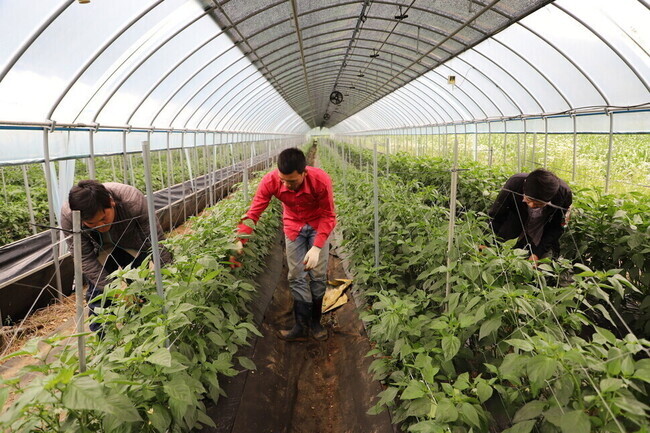hankyoreh
Links to other country sites 다른 나라 사이트 링크
2.5 million foreigners live in Korea, but little assistance is offered to the fast-growing segment

South Korea’s international population has continued to grow amid an all-time low birth rate and trends of population aging and decline.
But critics contend that little progress has been made in terms of systems to support these international residents in finding their footing.
In a Ministry of Justice monthly statistical report on immigration and foreign resident policy, the number of international residents in South Korea was calculated at 2,448,401 as of late January, up by 14.1% from the same month in 2023.
The number included 1,893,911 long-term residents, or roughly triple the 554,490 short-term international residents counted. The population of international residents rose from around 1.96 million in late 2021 to 2.25 million in late 2022. By late 2023, it had reached 2.51 million, or roughly 5% of the overall population.
The South Korean government has also been gradually expanding the numbers of foreign workers and other immigrants. With a worsening trend of population decline — particularly impacting small businesses and regions outside the Seoul metropolitan area — attracting international residents is being viewed as a necessity rather than a choice.
In addition to the allocation of seasonal international workers, issuance of employment permit system (E-9) visa, and expansion of yearly quotas for skilled workers, a regional specialized visa pilot program has also been underway for metropolitan and basic location governments facing severe workforce shortages.
The aim is to increase the de facto population by issuing customized visas reflecting regional workforce demand and by assisting international residents with establishing themselves in South Korea. Avenues are also being opened in the areas of caregiving and services through the introduction of a system for international domestic workers, for which a pilot program will begin this year.
But critics argue that the administration’s policies are focused mainly on supplying workers to relieve domestic shortages, while relatively neglecting the areas of settlement and support, which involve creating conditions for international residents to actually establish themselves.

Major issues include cases where international workers who have been granted employment permit system visas have been forced to endure harsh working conditions due to their inability to freely change jobs, along with examples of discriminatory treatment in terms of wages. Calls for excluding international domestic workers from the South Korean minimum wage have also been a source of controversy.
The administration’s policy approach was also visible in remarks made at the Korea Chamber of Commerce and Industry Jeju Forum last July by then-Justice Minister Han Dong-hoon, who currently chairs the People Power Party emergency leadership committee. At the time, he stressed that “immigration policy is not an area of equality or fairness.”
“It needs to be implemented in a way that is entirely oriented toward the happiness and national interests of South Korea’s public,” he argued.
Observers have been especially concerned about the potential for controversy and side effects from making use of inexpensive imported labor in caregiving and other service jobs, which involve interpersonal interactions.
Jang Young-ook, an associate research fellow at the Korea Institute for International Economic Policy, stressed the need for “support so that immigrants are able to become equal members of society with South Koreans, including stronger residential assistance and loosening of regulations that make it difficult to change workplaces.”
By Park Jong-o, staff reporter
Please direct questions or comments to [english@hani.co.kr]

Editorial・opinion
![[Guest essay] Preventing Korean Peninsula from becoming front line of new cold war [Guest essay] Preventing Korean Peninsula from becoming front line of new cold war](https://flexible.img.hani.co.kr/flexible/normal/500/300/imgdb/original/2024/0507/7217150679227807.jpg) [Guest essay] Preventing Korean Peninsula from becoming front line of new cold war
[Guest essay] Preventing Korean Peninsula from becoming front line of new cold war![[Column] The state is back — but is it in business? [Column] The state is back — but is it in business?](https://flexible.img.hani.co.kr/flexible/normal/500/300/imgdb/original/2024/0506/8217149564092725.jpg) [Column] The state is back — but is it in business?
[Column] The state is back — but is it in business?- [Column] Life on our Trisolaris
- [Editorial] Penalties for airing allegations against Korea’s first lady endanger free press
- [Editorial] Yoon must halt procurement of SM-3 interceptor missiles
- [Guest essay] Maybe Korea’s rapid population decline is an opportunity, not a crisis
- [Column] Can Yoon steer diplomacy with Russia, China back on track?
- [Column] Season 2 of special prosecutor probe may be coming to Korea soon
- [Column] Park Geun-hye déjà vu in Yoon Suk-yeol
- [Editorial] New weight of N. Korea’s nuclear threats makes dialogue all the more urgent
Most viewed articles
- 1Yoon’s broken-compass diplomacy is steering Korea into serving US, Japanese interests
- 2[Guest essay] Preventing Korean Peninsula from becoming front line of new cold war
- 3South Korean ambassador attends Putin’s inauguration as US and others boycott
- 4Behind-the-times gender change regulations leave trans Koreans in the lurch
- 5Family that exposed military cover-up of loved one’s death reflect on Marine’s death
- 6Yoon’s revival of civil affairs senior secretary criticized as shield against judicial scrutiny
- 7Japan says its directives were aimed at increasing Line’s security, not pushing Naver buyout
- 8Marines who survived flood that killed colleague urge president to OK special counsel probe
- 9Amid US-China clash, Korea must remember its failures in the 19th century, advises scholar
- 10‘Weddingflation’ breaks the bank for Korean couples-to-be